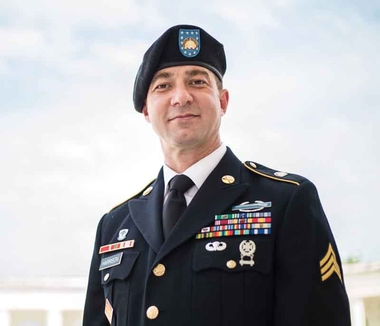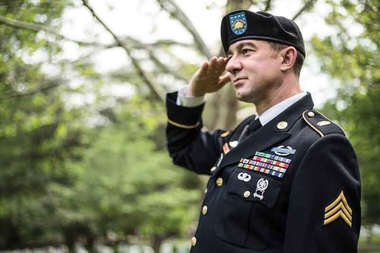Sergeant challenges military policy of HIV discrimination

by Robin Dorner
Editor in Chief
Sergeant Nick Harrison is living with HIV. He has no limitations. He can do everything anyone else can; he works out regularly, he runs and lifts weights. However, he is considered “deployable with limitations” and is being denied the opportunity to serve as an officer in the Army National Guard.
Harrison was denied a position in the Judge Advocate General Corps (JAG) due to current Pentagon policies. He also faces possible discharge from the United States armed services because he is living with HIV.
“I have no duty restrictions,” said Harrison. “On my last physical exam, I actually received the highest medical readiness score possible. I'm in better health and fitness than the majority of the people in my unit.”
On September 14, a Virginia federal court ruled in the case filed by Lambda Legal and OutServe-SLDN, along with pro bono counsel from Winston & Strawn LLP. It challenges the military’s discriminatory policies governing the enlistment, deployment, and promotion of service members living with HIV.
The plaintiff's motion to halt implementation of a new Department of Defense (DoD) policy that likely would have resulted in the discharge of service members living with HIV was also denied because the Pentagon modified the policy after the plaintiffs filed the motion.
The military set these restrictions for people living with HIV in 1991, five years before the advent of antiretroviral medication.
“At the time these policies were adopted in the 90s, they were probably considered compassionate. The military wasn't going to kick people out, but they weren't going to let them deploy, and they were going to make sure people with HIV got the best care available stateside until they got sick and couldn't do their jobs anymore,” Harrison said.
“However, things have changed a lot since then. HIV isn't a death sentence anymore. People take a pill a day, and there are no side effects. In a relatively short time, the person’s viral load becomes undetectable, which means the virus can't even be detected in their blood anymore, and they can't pass it on to anyone. They can do everything any other healthy person can do with no risk to themselves or others.”
Scott Schoettes, Counsel and HIV Project Director at Lambda Legal said, “The DoD issued the original version of DoD Instruction (6485.01), which made explicit that people living with HIV would be prohibited from enlisting, entering a training academy or commissioning as an officer.
“Prior to that time, I believe there was a de facto policy of preventing all of those things, as well as separation for those who tested HIV positive after beginning their service. When they started retaining people who test positive for HIV after beginning their service (either in the late 1980’s or early 1990’s), they classified them as non-deployable. At some point, they started allowing waivers for deployment on a very limited basis to specific types of posts.”
The plaintiffs argue the reasons to change the current military policies regarding personnel with HIV is antiretroviral treatments were introduced in 1996. From the beginning, those medications changed the lives of people with access to them, restoring a person’s immune system and returning them to health.
Over time, the medications have become very easy to use which made providing care to people living with HIV relatively easy.
“As of 2008, people who were consistently taking these medications were not capable of transmitting HIV,” Schoettes asserts. “Whatever minimal risk of transmission in the context of the battlefield has now definitively been eliminated for anyone who is taking their medications, as all members of the military must do by order.
“In other words, service members living with HIV are as capable as others, require no more care than others with chronic conditions who are allowed to deploy, and present no risk to the health or safety of themselves or others. It’s past time to let them serve.”

Harrison grew up in the Oklahoma City area and resided in the area for over thirty years until he graduated from law school. From there, he took a job in Washington, DC. He was stationed in Alaska and deployed to Afghanistan and Kuwait for five-and-a-half years. His family still lives in Oklahoma City.
“I miss the people I grew up with,” Harrison said. “Oklahoma is where I grew into myself, came to terms with my sexual orientation and became the person I am today. And there are a lot of people there, good friends, who helped me define myself.”
Harrison said he was diagnosed with HIV just after he came back from his last deployment to Kuwait.
“I had been given a temporary promotion as a headquarters platoon sergeant while I was overseas. I was a Staff Sergeant (E-6) at the time.
“I initially got the results from a blood test I took at a lab. I was still on Tricare, the military’s health plan, so I went into Tinker AFB to inform them of my newly discovered status. The receptionists initially wouldn't let me speak to a provider unless I told them at the front desk why I wanted to see someone. I asked to see a patient advocate. I told him, and he ran around finding out what the process was for this diagnosis. I understand it was reported all the way up to the Department of the Army. They then reached back down through the chain of command to notify my unit in the Oklahoma National Guard.”
Harrison has had zero complications related to his HIV diagnosis and said taking his HIV medication is inconsequential to his daily life.
“People on treatment really suffer no ill effects. It's no more intrusive than taking a daily vitamin or cholesterol pill. In fact, the military had us taking a pill-a-day regimen to prevent malaria when I was deployed to Afghanistan. So, it's no different than that. And as I said earlier, once you are taking the medication for a few months, your immune system is returned to normal, and you are restored to total health.”
The Sergeant said despite his diagnosis he feels supported by the military, except from people at the very top.
“Every unit I've been part of in the military has been supportive,” said Harrison. “My chain of command, both in Oklahoma and in Washington DC, never treated me any differently. That's part of the military's philosophy. We're all part of one team. Differences don't really matter. We only care about whether the person on our left or your right can do his or her job. The mistreatment is coming from the top—the people who refuse to update the policies.
“All service members with HIV want is for the Pentagon to let us do the jobs we signed on to do. These patriots love this country, volunteered to be soldiers, and look forward to the day they can serve to the full extent of their abilities, and to not be impeded by misperceptions about HIV.”
Harrison said he’s appalled the military won't let him serve as a JAG officer because of this outdated policy. “They'd rather throw away everything they've invested in my education and training than let me work in a military courtroom.”
Schoettes said there was a lot of concern earlier this year when the "Deploy or Get Out" policy was announced.
“Lambda Legal and OutServe do feel a sense of urgency to getting this case adjudicated, particularly now that the DoD has issued the “Deploy or Get Out” policy. The Defense Department has now backed off and modified the policy against which we filed our preliminary injunction, and it seems they will not be separating people living with HIV for the time being. But we still want to move quickly to fix the HIV-related personnel policies that result in the denial of important opportunities, like the appointment as an officer being denied to Nick Harrison.
“Nick should have been commissioned as a captain two years ago, and this is delaying the development of his military career.”
But Harrison said he is optimistic about the case.
“We had our first hearing [in September]. The judge asked the military why they wouldn't allow me to commission so I could serve as a JAG officer, working in the courtroom, after investing so much in my education and training. The DOJ lawyers did not have a good answer to that question, and I think the accessions bar is going to be tough for the government to justify.
“I'd like to see the staff officers rewrite the policy to remove the special restrictions and bars to service for people living with HIV and let us serve. People living with HIV just want to do their jobs—like everyone else in the military.”
Schoettes said they want to see an end to these discriminatory policies. “People who are living with HIV should no longer be singled out for special restrictions or bars to their service. We just want people living with HIV to be handled in the same manner as everyone else, including those with other chronic conditions.”
Harrison said, “I think the most important take away is that people living with HIV are just like everyone else. Medicine has advanced light years in a relatively short amount of time. We can live long, healthy lives. We can have meaningful, intimate relationships. And we can do any job in the world without posing a risk to anyone else.
“We just want to be seen for the people we are.”
Read more about the Harrison v. Mattis case at www.bit.ly/gayly47.
Copyright The Gayly – October 8, 2018 @ 11:25 a.m. CDT.





